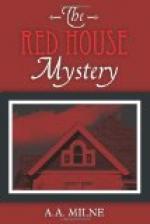“Oh, quite. Not that you would have convinced me, you know. Just as Elsie’s evidence doesn’t convince me.”
“Elsie?” said Bill excitedly. Antony looked inquiringly at him, wondering who Elsie was.
“One of the housemaids,” explained Cayley. “You didn’t hear what she told the Inspector? Of course, as I told Birch, girls of that class make things up, but he seemed to think she was genuine.”
“What was it?” said Bill.
Cayley told them of what Elsie had heard through the office door that afternoon.
“You were in the library then, of course,” said Antony, rather to himself than to the other. “She might have gone through the hall without your hearing.”
“Oh, I’ve no doubt she was there, and heard voices. Perhaps heard those very words. But—” He broke off, and then added impatiently, “It was accidental. I know it was accidental. What’s the good of talking as if Mark was a murderer?” Dinner was announced at that moment, and as they went in, he added, “What’s the good of talking about it at all, if it comes to that?”
“What, indeed?” said Antony, and to Bill’s great disappointment they talked of books and politics during the meal.
Cayley made an excuse for leaving them as soon as their cigars were alight. He had business to attend to, as was natural. Bill would look after his friend. Bill was only too willing. He offered to beat Antony at billiards, to play him at piquet, to show him the garden by moonlight, or indeed to do anything else with him that he required.
“Thank the Lord you’re here,” he said piously. “I couldn’t have stood it alone.”
“Let’s go outside,” suggested Antony. “It’s quite warm. Somewhere where we can sit down, right away from the house. I want to talk to you.”
“Good man. What about the bowling-green?”
“Oh, you were going to show me that, anyhow, weren’t you? Is it somewhere where we can talk without being overheard?”
“Rather. The ideal place. You’ll see.”
They came out of the front door and followed the drive to the left. Coming from Waldheim, Antony had approached the house that afternoon from the other side. The way they were going now would take them out at the opposite end of the park, on the high road to Stanton, a country town some three miles away. They passed by a gate and a gardener’s lodge, which marked the limit of what auctioneers like to call “the ornamental grounds of the estate,” and then the open park was before them.
“Sure we haven’t missed it?” said Antony. The park lay quietly in the moonlight on either side of the drive, wearing a little way ahead of them a deceptive air of smoothness which retreated always as they advanced.
“Rum, isn’t it?” said Bill. “An absurd place for a bowling green, but I suppose it was always here.”
“Yes, but always where? It’s short enough for golf, perhaps, but—Hallo!”




